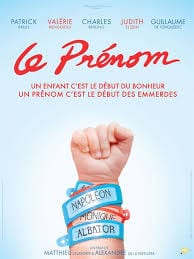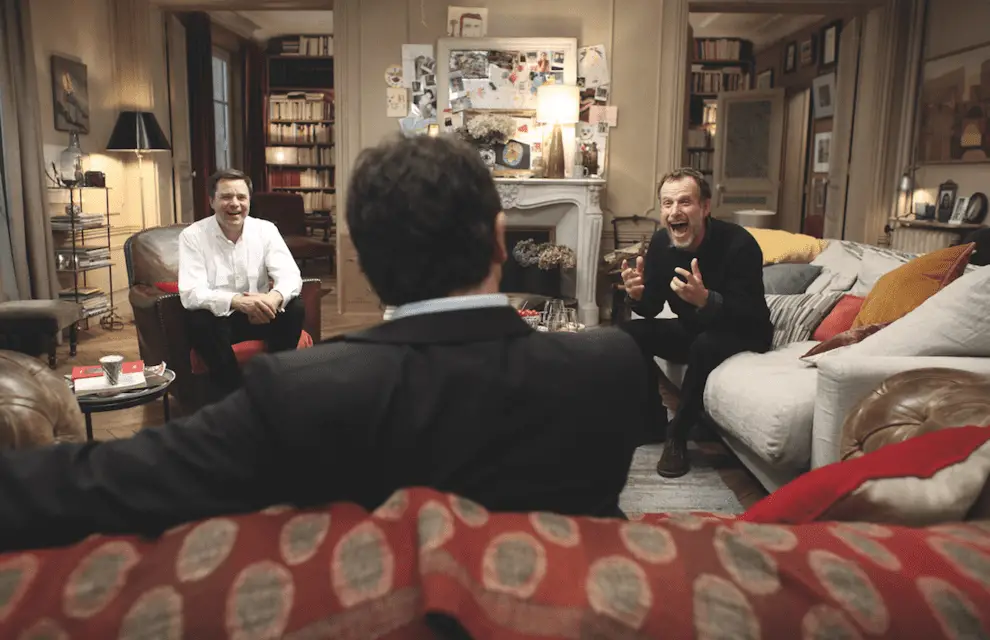What’s in a Name? (original title Le Prénom literally “The Given Name”) is a French movie that is the shining example of what is best in traditional French. It was also a popular and critical success. Indeed it earned back more than twice its original budget, two of its actors won César (the French Oscar) thanks to it, and it also received two award in Canada. It was also remake in Germany this year. And you know what? What’s in a Name? deserves its success because it is a very fun movie.
It isn’t just a fun movie though. Before being made into a movie in 2012, What’s in a Name? was a play. Also called Le Prénom, the play, which originally shared nearly all its casting minus one actor with the movie, was staged in 2010 and also met with success. I personally discovered What’s in a Name? in its movie form but I recently had the chance to watch the play (with a different cast but in the original theater that had staged it). And I laughed so much.
That’s why I wanted to talk about What’s in a Name? today. Not only because it is a good comedy no matter its form. But also because what is at the core of the humor of the story deserves to be talk about. What happens when a joke goes to far?
Synopsis
Vincent is a charming, slightly macho, boastful man. He recently married, and he and his wife, Anna, are about to have a baby. They have both been invited to a diner by Vincent’s sister Elisabeth, nicknamed Babou. Babou is a middle school French (literature) teacher married to Pierre, a university professor who specialized in Montaigne’s works. Claude (a man—I clarify because Claude is a gender-neutral name in French), Babou’s best friend, is also invited. Anna is going to be late because she has work to finish.
While the evening starts rather nicely, everyone being there except for Anna, things go south really quickly when Vincent announces the name of his son.

Huis Clos and dubious choices
Okay here we go for a spoiler warning. There’s nothing that should completely prevent you from enjoying the movie if you want to watch it, but still. I am going to disclose the name chosen by Vincent, information kept from the official synopsis and trailer of the play and the movie, as well as something else. So if you want to enjoy What’s in a Name? as the original creators intended, stop here. That being said, let’s dive in.
The given name
Vincent announces his family that he wants to call his son Adolphe. Yes like Adolf (Adolphe is the French form of Adolf). And yes it is pronounced the same way. Okay you might want to spend more time on the f but let’s be real, Adolphe sounds like Adolf.
Except Vincent isn’t naming is son after Hitler, no. He is naming him after Adolphe the hero of the novel of the same name by Benjamin Constant (written in the 19th century). Most importantly, Vincent doesn’t see the problem with naming his son Adolphe. Should we stop using a name (with a different spelling) because someone monstrous had this name? Should we stop using Joseph, Benito, Francisco, Paul (Pol)? You get the argument.
Of course this starts an argument of massive proportions among the guests at dinner. Especially between Vincent and Pierre. Pierre is probably the person who gets the most upset about it. Things are said that would have never been said if no one had wanted to call their son Adolphe but can’t be taken back. People attack each other on nearly unrelated things, etc etc. In short, it’s a mess.
The joke
That’s the twist. Vincent is joking about his choice of name. He is going to name his son after his father, Henri. He saw the novel in Pierre and Babou’s bookshelf and thought it would be funny to start by saying that the baby is going to be named Adolphe. But he keeps the joke going for a long time, one could argue for too long. And all because Pierre getting angry at him makes him laugh.
No one, except Claude who saw the book on the bookshelf, thinks Vincent is joking. And no one is laughing except Vincent and Claude (the latter of whom laughs way less). Yes, their exchanges are incredibly funny for the audience, because the dialogue is well written and the comedic timing is excellent, but it’s not because the joke is funny in-universe for the characters. Vincent keeps going for his own distraction. That Claude actually discovered the scheme is of no consequence to him as long as he lets him continue.
That’s where I think What’s in a Name? is really good in terms of theme, it’s a comedy about bad jokes.
When a joke goes to far
You know Vincent’s joke could actually have been funny in-universe. It could have gone like this:
Vincent: His name is going to be Adolphe!
The others: What???!!!
Vincent: Kidding! You should have seen your faces!
But of course it would have been way less funny for him. Because Pierre wouldn’t have entered such a rage. A rage that was by definition ridiculous because he was enraged at a situation that didn’t actually exist. Babou wouldn’t have tried to pitifully calm down her husband, etc. Except a joke isn’t really a joke when the only person laughing at it is the one making it. It is way closer to bullying.

What’s in a Name? doesn’t let Vincent get away of this easily. The whole thing brings his sister’s marriage close to collapse, her friendship with Claude too. It also nearly destroys Vincent’s marriage as well, because trust me, when Anna shows up (and that Babou and Pierre still don’t know that Adolphe is a joke), she doesn’t find it funny at all. It also nearly destroys Vincent and Babou’s relationship with their mother. All so Vincent could have a good laugh, and us too because this meltdown is very funny for the audience.
By the end of the movie/play, Vincent has learned his lesson. He is going to take better care of the persons he loves and cares about. Because having your pregnant wife being super close to leaving you because of a stupid joke you made makes you reconsider things. He’s still a rascal and a boaster, but he is also probably a better brother, brother-in-law, friend, and husband. And that’s why all his family is gathered around him for the birth of his… daughter!
The women in What’s in a Name?
Another thing that What’s in a Name? does particularly well is its female characters’ arc. Anna doesn’t really have one because she is the only secondary character of the play, but she reaffirms her agency and her opinions several times. She is a brilliant, beautiful woman with an interesting job. While the point of her character is to be Vincent’s wife, she is fleshed out enough for you to get she is more than that as a person. So, when she threatens to leave Vincent if he continues as he is, you know she is dead serious. She isn’t about letting any one talk down to her.
Which leads me to Babou. Babou who cooked the diner, who started the story by looking for the cellar keys because her husband wanted to know where they were (not because he needed to go to said cellar), who spends a considerable amount of the story trying to calm down her husband. Yes, that Babou, who couldn’t even live her own indignation because Pierre’s was so strong it basically stole hers. Because it’s not an accident that the main argument happens between Pierre and Vincent, two men. It’s because they’re like that. They like taking center stage, talking above other people, especially their wives. And yes, it is called out by the story.

Babou has a lot to say about the behavior of her brother and her husband. And she ends up saying it in the most epic monologue of the play/movie (nicely titled by the person who uploaded it, “Who is going to ask for my forgiveness?”). This is incredible. The bile this woman puts out about her position as a woman in a patriarchal society is both true-to-life and well written.
So yes, in addition to being a good commentary on bad jokes and their consequences What’s in a Name? also tackles how often women have to clean up the mess men create with those jokes. Clearly What’s in a Name? had its cake and ate it too.
Conclusion
I definitely encourage you to watch the film What’s in a Name? or watch the play, which is now being staged in Paris with English subtitles. You are never going to laugh so much about bad jokes.

